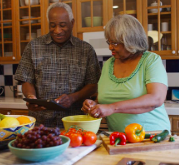Sustainable weight loss doesn’t begin in the gym or with a complicated diet—it often begins in the kitchen. Healthy cooking habits can form the foundation for long-term wellness, making it easier to enjoy nutritious meals that support your goals without feeling deprived. By preparing your own meals and focusing on whole, balanced ingredients, you can create a lifestyle that supports not just weight loss, but also better energy, improved digestion, and a greater sense of control over your health.
Why Cooking at Home Makes a Difference
When you cook at home, you make every decision about what goes into your food. You choose the ingredients, the methods, and the flavors. This level of control naturally leads to healthier meals with fewer hidden sugars, unhealthy fats, and preservatives. Unlike many restaurant dishes or packaged meals, home-cooked food gives you the chance to balance meals in a way that matches your body’s needs.
Cooking at home also encourages mindfulness. As you spend time washing vegetables, seasoning lean proteins, and watching your dish come together, you begin to understand the value of each ingredient. This process builds a better relationship with food, which can reduce emotional eating and help with portion awareness over time.
Building a Balanced Plate
One of the most sustainable approaches to weight loss is learning to build balanced meals rather than following strict diet rules. A healthy plate usually includes a variety of vegetables, a moderate portion of protein, a small serving of whole grains or starchy vegetables, and a bit of healthy fat for flavor and satisfaction.
By using healthy cooking techniques—like roasting, steaming, sautéing with olive oil, or grilling—you preserve nutrients and bring out natural flavors. Herbs and spices can make any dish come alive without adding calories. Over time, you begin to prefer the taste of fresh, home-cooked meals over heavy, processed foods.
Keeping it Simple with Everyday Ingredients
Healthy cooking doesn’t mean you need to master gourmet recipes. In fact, simplicity is often key to long-term success. Whole ingredients like brown rice, oats, beans, leafy greens, lean chicken, salmon, and seasonal fruits can form the base of dozens of satisfying meals. With a little planning, you can prepare these foods in bulk or in batches that make cooking during the week less stressful.
Using pantry staples like canned tomatoes, herbs, olive oil, and garlic can help you build flavor in your meals without needing fancy sauces or mixes. It’s not about making perfect meals—it’s about finding combinations that you enjoy and that fuel your body well.
Turning Cooking into a Supportive Habit
When healthy cooking becomes a habit, it stops feeling like a chore. Instead, it becomes a natural part of your lifestyle. Scheduling time to prep ingredients once or twice a week can take the stress out of daily meal decisions. Keeping healthy snacks like cut vegetables, hummus, yogurt, or nuts on hand also helps you stay on track between meals.
Some people find joy in learning new recipes each week, while others prefer rotating a handful of trusted meals. Both approaches work. The key is to find what feels manageable and enjoyable so that you’re not tempted to fall back into old patterns of takeout or convenience foods.
Making Room for Flexibility
Sustainable weight loss isn’t about eating perfectly. It’s about making healthy choices most of the time, while still allowing space for treats and social meals. Healthy cooking can include your favorite comfort foods with a few simple adjustments—like baking instead of frying, using leaner cuts of meat, or adding extra vegetables to boost volume and nutrition.
Flexibility also helps you stay consistent. If you’re tired one night, a simple soup or wrap with leftovers can be just as nourishing as a full meal. Giving yourself permission to adapt keeps you motivated without guilt or frustration.
Involving Family and Friends
Healthy cooking doesn’t have to be a solo activity. Sharing meals with others or involving your children or partner in meal prep can make the experience more meaningful. When the people around you support your goals, it’s easier to stay motivated and to enjoy the process.
Cooking together also provides opportunities to teach healthy habits and create positive mealtime traditions. Even small efforts—like letting kids help stir ingredients or choose a vegetable for dinner—can plant the seeds for healthier habits in the future.
Celebrating Progress Over Time
One of the most rewarding parts of cooking for sustainable weight loss is seeing your progress over time. At first, it might feel new or even intimidating. But as you build confidence, you’ll notice that cooking becomes easier, meals become more satisfying, and your body feels more energized and nourished.
As your cooking skills improve, so does your ability to listen to your body. You’ll start to recognize which meals leave you feeling full and focused, and which ones weigh you down. This awareness becomes a powerful tool for lasting change—one that diets rarely teach.
Connecting Food to Your Wellbeing
Ultimately, healthy cooking connects you to more than just the food on your plate. It builds awareness around your habits, emotions, and environment. When you choose ingredients thoughtfully and prepare meals with care, you’re investing in your health, your energy, and your future.
This connection encourages a mindset shift—from chasing a number on the scale to embracing a way of life that supports long-term wellness. Food becomes something to enjoy, not fear. And cooking becomes a daily act of self-care rather than a burden.
Conclusion: A Path You Can Stick With
Sustainable weight loss through healthy cooking isn’t about short-term sacrifice. It’s about creating a lifestyle that supports you—one where meals are nourishing, cooking is enjoyable, and progress is steady and realistic. By taking small steps to improve your cooking habits and focusing on what feels good in your body, you can build a way of eating that truly lasts.
You don’t need to be perfect to succeed. You just need to keep showing up, one homemade meal at a time.














